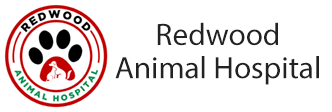Surgery FAQs
My pet is scheduled for surgery, what should I do?
The night before remove all food after 9pm and do not feed your pet the morning of the surgery. Water is fine. Try to not be too nervous as your pet will sense that and will also get worried. We usually recommend surgical patients to be dropped off early in the morning between 8:00am and 8:30am.
What happens once I drop off my pet?
- Pre-anesthetic/Pre-surgical exam:
- Shortly after being dropped off, one of our veterinarians will perform a complete pre-anesthetic/pre-surgical examination to ensure no new illness is diagnosed.
- Pre-anesthetic blood work:
- At Redwood Animal Hospital we do pre-anesthetic bloodwork on all of our surgical patients. This to make sure it is safe for your pet to undergo general anesthesia. Even though we use very safe anesthetic drugs, there is always an anesthetic risk and our goal is to make sure that risk minimal. Many anesthetic drugs are metabolized through the kidneys and liver and this is why patients with liver and kidney disease are considered high anesthetic risks. If your pet has a heart murmur, he/she also has an increased anesthetic risk.
- Radiographs, ultrasounds, special blood test:
- If your pet is older or our veterinarian discover something abnormal, she might recommend additional test such as Xray to look at the heart size, a bile acid test to make sure the liver is working properly.
How is my pet anesthetized?
- Sedation:
- Once our veterinarian has examined and reviewed the bloodwork and has determined it is safe to proceed with the surgery, your pet will receive an injection to sedate him/her. It is usually a combination of a pain medication and an anxiolytic.
- Intravenous (IV) catheter:
- Most pets undergoing anesthesia will have an IV catheter. This is to provide quick access to a vein to inject medication or shall an emergency occur
- Induction / Intubation / General Anesthesia:
- Your pet is now ready to be anesthetized. Our veterinarian will administer one short-acting anesthetic injectable agent and intubate your pet. Your pet’s endotracheal tube will then be connected to oxygen and an anesthetic gas (sevoflurane or isoflurane). Your pet is now under general anesthesia.
How do you monitor anesthesia?
At Redwood Animal Hospital, we use the latest technologies available to ensure your pet has a safe anesthetic experience. Your pet is always being monitored. We check blood pressure, EKG (Electrocardiogram), pulse oxymeter (to measure the oxygenation of your pet), heart rate, respiration rate, mucous membrane color, temperature.
When can my pet go home, and what should I do at home?
As soon as the surgical procedure is over, we will call you and give you an estimated pick-up time. Usually after 2:00pm. At that time, one of our veterinary technicians will go over specific discharge instructions for your pet. For most pets that went under general anesthesia we recommend to wait at least 2 hours after you get home to offer a small amount of food and water. It is not uncommon during the first 24 hours for your pet to be sleepy, not hungry, or even have diarrhea or vomits once or twice. If you have any questions it is best to call us.
